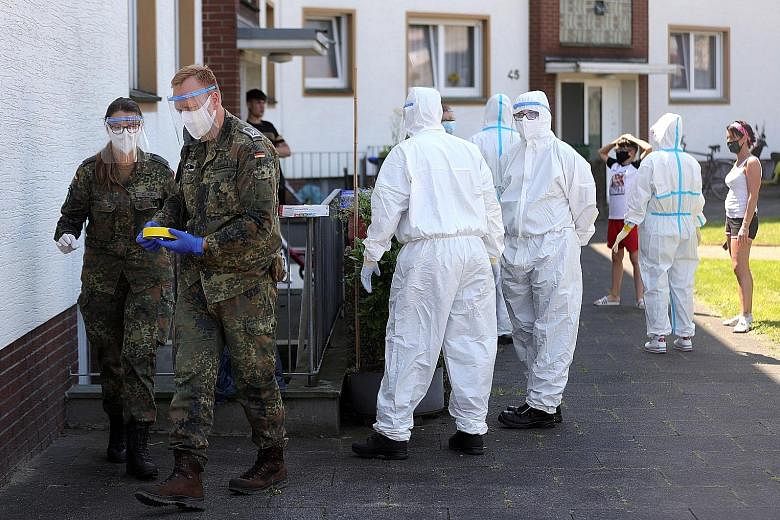OLDENBURG (Germany) • Leaving Poland to work at a slaughterhouse in wealthy Germany, Eva imagined herself in white rooms sterilised like operating theatres, with sophisticated machinery and regulated work hours. Instead, she said she worked shifts from 4am to 4pm on slimy production lines, and ended up trapped in a coronavirus outbreak.
"They cared only about social distancing and temperature checks at the entrance. Once we were inside, no one cared about us," said Eva, speaking by telephone from her apartment where she is quarantined with two sick housemates. She asked not to give her full name, fearing retaliation from her contractor.
"I never saw a hygiene inspector. I never saw a surface disinfected."
As workers began disappearing earlier this month, Eva suspected the coronavirus. Now her plant, run by the Toennies company, has been hit with the largest outbreak since Germany reopened from the pandemic. Some 1,500 are symptomatic, and 7,000 like her are in quarantine. The entire Gutersloh district of north-western Germany where the plant is located was forced back into lockdown.
Toennies did not respond to requests for comment, but Mr Clemens Toennies, the co-founder of the company, has publicly apologised for the outbreak.
While Germany has a generous welfare system, strong trade unions and a general lack of labour strife, its meat industry is the glaring exception. German slaughterhouses exploit a loophole in the system: Subcontractors supply the bulk of workforces - mostly eastern Europeans.
Activists long struggled to focus public attention on an industry that delivers low prices at the cost of miserable conditions for tens of thousands of foreign workers. It took the pandemic to force a national reckoning.
"Everyone is finally shocked," said Mr Piotr Mazurek of Fair Mobility, which counsels migrant workers. "Coronavirus helped increase the pressure."
Food plants, particularly abattoirs, were quickly recognised by scientists as prime Covid-19 incubators. Cold, wet environments help preserve virus-infected droplets - and production lines are ideal spreaders.
"In these enclosed areas and on busy production lines, social distancing is more difficult," said Professor Lawrence Young of Warwick Medical School. "Speaking loudly or shouting across the noise of machinery can also result in the production of more infectious droplets and aerosols."
Conditions are exacerbated because most workers are forced to share cramped housing and transport. At the Fair Mobility office in the northern German town of Oldenburg, Mr Mazurek fields calls from frustrated workers, some of whom send photographs of rooms with beds crammed together, head to foot, or mouldy, rusted shared bathrooms.
Andre, who worked for the subcontractor Meat Pros and asked not to be identified by his full name, sank into depression after discovering his pay was a third of what he believed it would be. He earned €1,100 (S$1,720) a month for 11-hour shifts at a slaughterhouse, often working six or seven days a week.
Inside the plant, he said, workers were constantly mixed into different teams, unable to even isolate by group. Hanging piles of sausages between 16kg and 20kg, they moved at such a frantic pace that he never dared question health measures.
"We wanted to say something. But we were under pressure. The tempo of work was so stressful," he recalled. "We were afraid."
Meat Pros did not immediately respond to requests for comment.
Professor James Wood, who specialises in veterinary medicine at Cambridge University, said large outbreaks raise questions over labourers going to work unwell. Several abattoir workers said they felt punished for looking after their health. Eva said her subcontractor docked €10 per sick day before the outbreak.
For decades, subcontracting offered such an advantage to the German meat industry that many producers in Denmark, the Netherlands and Belgium simply moved plants to Germany.
"If Germany managed to regulate its meat industry it would be a good signal to Europe," said Professor of Public Policy Anke Hassel of the Hertie School of Governance in Berlin. A previous effort five years earlier, she said, was blocked by lobbyists.
Slaughterhouses hold subcontractors responsible for abuse, but subcontractors, paid for production, are themselves under huge pressure - Eva's plant at Toennies processed 20,000 pigs a day.
Consumers expecting low prices also bear some responsibility, according to Agriculture Minister Julia Kloeckner.
"Meat shouldn't be a luxury product for rich people," she told German news agency DPA. "But it also can't be everyday cheap trash."
German Labour Minister Hubertus Heil has vowed to introduce a law in Parliament to end subcontracting, with a new system in place by next year. Some foreign-owned plants already said they were behind the move.
"We fully back plans to end this subcontracting system," said Mr Jens Hansen, a spokesman for Danish Crown, which moved some production to Germany to save up to 50 per cent on processes such as pig-deboning. "It has been a challenge to the meat industry all over Europe, to have such low-cost workers for meat in Germany."
PHW Group, whose poultry plant in Wildeshausen became the site of another outbreak last week, with 34 of 1,100 workers infected, recently announced it would end the use of subcontractors.
Inside her quarantined apartment, Eva is eager to leave Germany, and is unsure what conditions could ever tempt her back.
She is sure of one thing, though: She will never buy meat from her old employer. "I still buy from others - probably because I haven't seen the conditions there myself."
FINANCIAL TIMES

